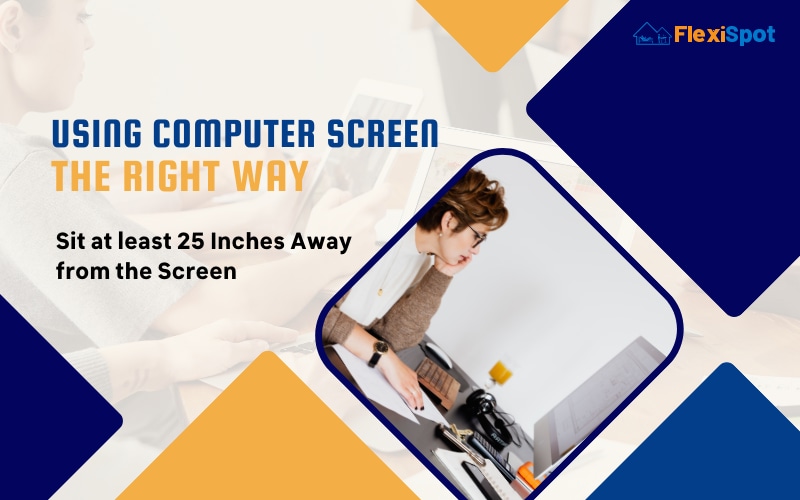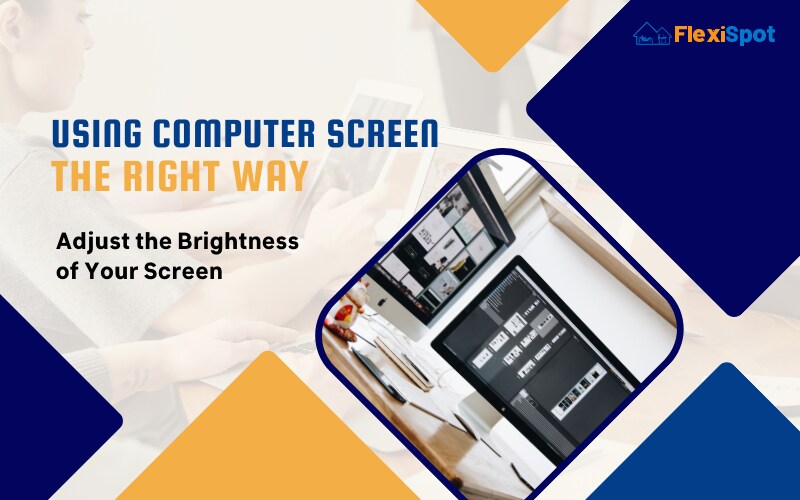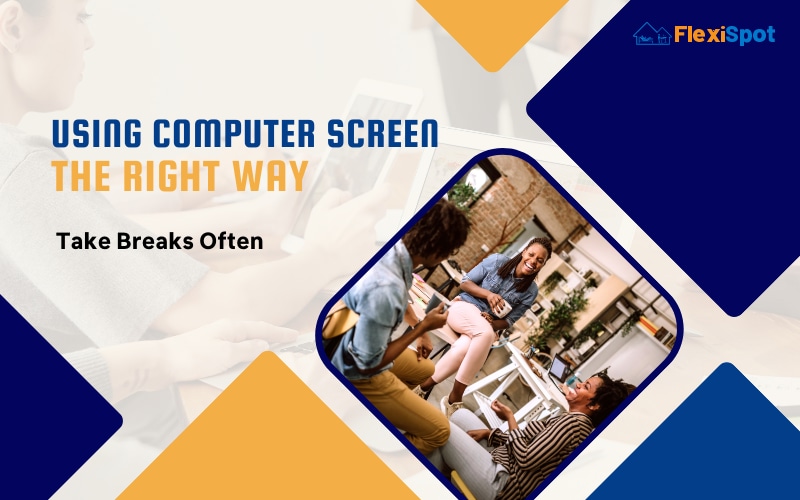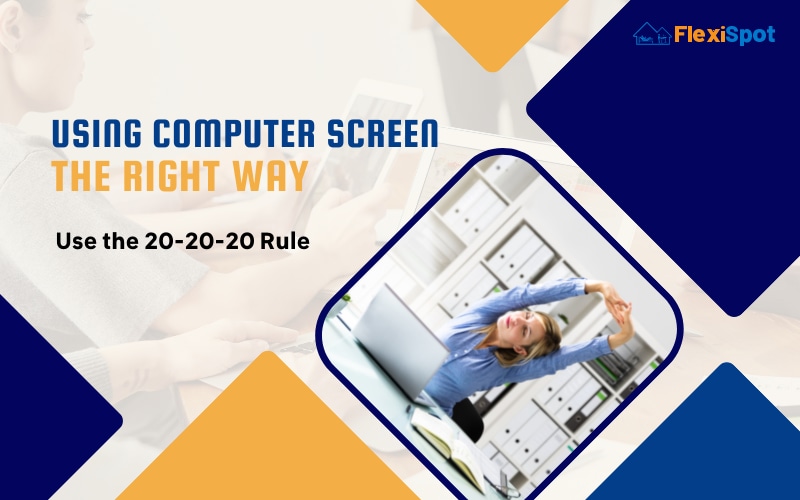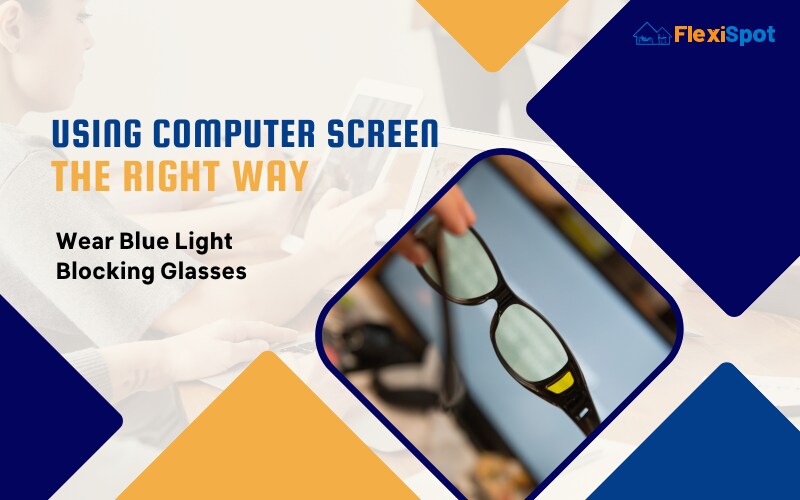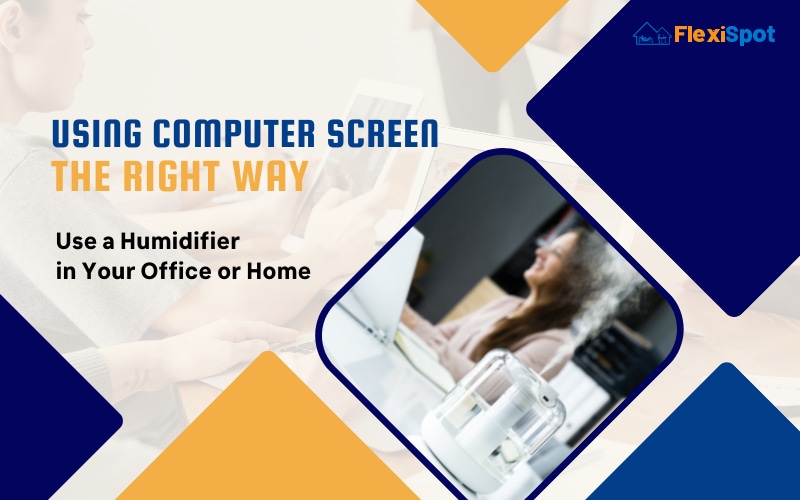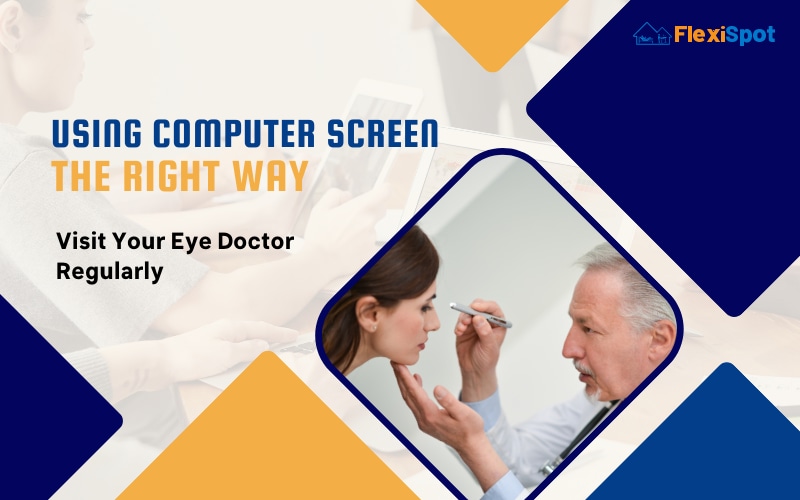It's no secret that spending long hours staring at a computer screen can be hard on your eyes. In fact, eye strain is one of the most common complaints among computer users. As more and more people turn to use computers for most of their days, the concern towards damaged eyes continues to rise, and it's therefore very important that you take the needed precautions to ensure your eyes are protected at all times. Here are some tips you can try.
Sit at least 25 Inches Away from the Screen
Most of us are guilty of spending far too much time looking at screens. Whether it’s our computers at work, our phones on the go, or the TV at home, we’re often bombarded with bright lights and images.
And while there’s no doubt that screen time has its benefits, it’s important to take breaks and view screens from a distance every so often. Why? Because looking at screens up close can strain your eyes and lead to headaches.
To avoid these issues, experts recommend sitting at least 25 inches away from the screen when possible. This may seem like a lot of space, but it will help your eyes stay healthy in the long run. So the next time you’re working on a project or watching a movie, make sure to take a break every so often and give your eyes the rest they need. Your head will thank you for it.
Adjust the Brightness of Your Screen
When using a computer or any bright screen, it is necessary to adjust the brightness of your screen. The human eye is not very good at adjusting to different light levels, and staring at a bright screen for extended periods of time can strain your eyes.
To avoid this, you should adjust the brightness of your screen so that it is comfortable for you to look at. You can do this by going into the settings menu of your computer or device and finding the “Display” or “Screen” section. From there, you should be able to find the brightness setting and make the adjustment.
If you are having trouble finding the right setting, you can try using an app like f.lux, which will automatically adjust the brightness of your screen based on the time of day.
No matter what method you use, it is important to ensure that you are not straining your eyes by looking at a bright screen for extended periods. Adjusting the brightness of your screen is a simple way to ensure that you are comfortable and can avoid any potential eye strain.
Take Breaks Often
It is necessary to take breaks often when using a computer or any bright screen. This is because the human brain is not wired to process large amounts of information for extended periods of time. When we overwork our minds, we experience mental fatigue, leading to decreased productivity and focus.
Taking regular breaks helps to refresh the mind and allows us to return to work with renewed energy and concentration. It is important to step away from the screen every 20 minutes or so and take a few minutes to rest your eyes and relax your mind. Get up and walk around, stretch, or do something completely unrelated to work to give your brain a break.
Allowing yourself time to take breaks will ultimately improve your productivity and help you to avoid burnout. It is important to listen to your body and mind and take a break when you feel like you need one. Trust me; your future self will thank you for it.
Use the 20-20-20 Rule
We’ve all heard it before – too much time in front of the computer screen is bad for our eyes. But did you know there’s an easy way to protect your vision while working? It’s called the 20-20-20 rule, and it’s simple: every 20 minutes, take a 20-second break and look at something 20 feet away.
This may not seem like much, but it can make a big difference in your eye health. Looking at a computer screen for long periods of time can cause eyestrain, dry eyes, and even headaches. But you can minimize these symptoms by taking regular breaks and giving your eyes a chance to rest.
So next time you’re stuck in front of the computer, remember the 20-20-20 rule. It’s a quick and easy way to protect your eyesight.
Wear Blue Light Blocking Glasses
The blue light that is emitted from these screens can be detrimental to our eyesight. It can cause digital eye strain, leading to dry eyes, headaches, and migraines. Wearing blue light-blocking glasses can help to reduce these symptoms and protect our eyes from the harmful effects of blue light.
There are a few things to consider when choosing blue light-blocking glasses.
The first is the lens type. Two types of lenses can be used to block blue light: polarizing and anti-reflective. Polarizing lenses are more effective at blocking blue light but can also cause glare. Anti-reflective lenses are not as effective at blocking blue light, but they do not cause glare.
The second thing to consider is the frame style. There are three main styles of frames: full-frame, half-frame, and rimless. Full-frame glasses cover the entire eye and provide the most protection from blue light. Half-frame glasses cover just the upper part of the eye and provide less protection from blue light. Rimless glasses do not have any frames and provide the least protection from blue light.
When choosing blue light blocking glasses, it is important to consider the lens type and frame style that best suits your needs. If you spend a lot of time looking at screens, it is advisable to choose glasses with polarizing lenses. If you are sensitive to glare, then you should choose glasses with anti-reflective lenses. And if you want the most protection from blue light, then you should choose full-frame glasses.
Use a Humidifier in Your Office or Home
When you use a computer or any bright screen, you are actually causing your eyes to dry out. This is because you are not blinking as often as you normally would. While this might not seem like a big deal, it can lead to some serious problems.
One of the most common problems that can occur from eye dryness is called computer vision syndrome (CVS). CVS is a group of symptoms that include eyestrain, headaches, and even neck and shoulder pain. In severe cases, it can even cause double vision.
While there are several ways to help reduce the symptoms of CVS, one of the best things you can do is to use a humidifier in your office or home. This will help keep the air around you moist, which will help keep your eyes from drying out.
There are several different types of humidifiers on the market, so you should be able to find one that fits your needs and budget. Just be sure to get one that is specifically designed for use with computers, as some humidifiers can actually damage sensitive electronic equipment.
So, if you are someone who spends a lot of time in front of a computer or any other bright screen, be sure to take steps to protect your eyes by using a humidifier in your office or home. Your eyes will thank you for it.
Visit Your Eye Doctor Regularly
It's no secret that spending long hours in front of a computer screen can take a toll on your eyes. If you don't take proper precautions, you could get digital eye strain, blurry vision, and headaches.
That's why it's so important to visit your eye doctor regularly, even if you don't think you have any problems with your vision. Your eye doctor can catch early signs of digital eye strain and help you prevent more serious problems down the road.
Here are a few tips to help you protect your eyes when using a computer:
Take breaks often. Get up and walk around every 20 minutes or so to give your eyes a break from the screen.
Adjust your settings. Ensure your computer screen has the right brightness and contrast levels for your eyes.
Use eye drops. If your eyes feel dry or strained, use artificial tears to help relieve the symptoms.
See your eye doctor. Schedule an appointment with your eye doctor if you experience any persistent problems with your vision.
Following these simple tips can help keep your eyes healthy and avoid digital eye strain. Remember to visit your eye doctor regularly for comprehensive vision care.
Conclusion
Protecting your eyes when using bright screens at home or in the office is important. Exposure to blue light from screens can cause eye strain, headaches, and even sleep problems. You can reduce your risk of these problems by using screen filters or wearing blue-light blocking glasses. Taking breaks from watching screens every 20 minutes can also help reduce eye strain. Follow all these tips, and you can work in peace without issues.
